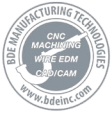Posted On: December 17, 2021
Milling is one of the most popular CNC machining services employed for producing non-rotating and rhomboid parts used across industries. The milling machines use high-speed milling cutters to shape the work object into the desired shape. The cutter cuts the metal on the work piece into chips. These chips are separated from the work piece as soon as cutting is performed. The shapes and sizes of these chips differ according to the type of work piece materials used, cutting conditions, and deformation caused during the process. The chips thus produced are generally differentiated based on their shapes into continuous chips, non-continuous chips, and continuous chips with build-up edge, and non-homogenous chips. Would you be intrigued to know how these chips work and more? If your answer sounds yes, this post introduces you to the same and more.
Types of Chips Used in CNC Milling Machines
The following are a few popular types of chips in CNC milling.
- Discontinuous Chips:
Discontinuous chips possess non-homogeneous shape and they generally deform due to repeated fracturing. . Work pieces made of hard and fragile metals like cast iron, brass, and bronze are known to produce discontinuous chips. Ductile workpieces also produce discontinuous chips in scenarios when the friction between a work piece and tool is high. Discontinuous chips are formed due to reasons such as low feed rate, high cutting speed, the tool with a small rake angle, in-depth cut on the material, and so on. Formation of discontinuous chips on brittle materials helps improve their surface finishing, and reduces the power consumption. However, formation of discontinuous chips in ductile materials lead to poor surface finish, and may increase the machining time, too.
- Continuous Chips:
Continuous chips, also referred to ribbon-type chips, are homogenous and possess no breakage or segments, which makes them unique. These chips are bonded together and they form a long coil. Continuous chips are obtained while cutting ductile materials like aluminum, low carbon steel, mild steel, etc. The chips possess tiny notches on their upper side while the underside is smooth and shiny. Continuous chips are created when work pieces made of ductile materials are used. High cutting speeds, large rake angle, small cut depths, low coefficient of material, and low friction are some other factors leading to the formation of continuous chips.
- Non-homogeneous Chips:
Non-homogeneous chips also called as serrated chips are semi-continuous. They resemble saw tooth in appearance due to low and high shear strain zones. These chips are generally formed in materials with low thermal conductivity or whose mechanical strength on thermal softening. Titanium alloys, nickel and austenitic stainless steel are some examples of work piece materials that can form non-homogenous chips on machining. A large strain that develops at the chip surface of the tool while cutting hard materials at medium cutting speeds is one of the causes of non-homogenous chips.
- Continuous Chips with Built-up Edges:
Though these chips are very similar to the continuous chips but are not as smooth as those chips. These chips are formed when ductile work materials are cut at high temperatures in high speeds. In such scenarios, the friction produced between the tool and work piece is too high. Thus, the chips stick to the edges of the tool. When these chips add up in successive layers the tool built edges are formed. The size of this built-up edges continuously change during the cutting. High temperature and pressure between the tool and the work piece material, using improper coolant, high friction at the cutting tool face, and machining ductile materials are some common causes of continuous chips with built-up edges.
The above information will help you in understanding the importance of chips in milling and their types. If you are looking for an experienced CNC milling service to partner for the next project then BDE Manufacturing Technologies is the best choice. The company provides various types of CNC milling services including boring, knurling, face milling, facing, reaming, hard turning, parting, and grooving, peripheral milling, and so on.
 info@bdeinc.com
info@bdeinc.com 866.262.6233
866.262.6233





